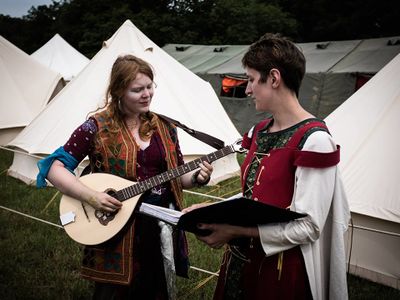Troubadour
No edit summary |
|||
| (6 intermediate revisions by 3 users not shown) | |||
| Line 1: | Line 1: | ||
{{CaptionedImage|file= | {{CaptionedImage|file=DawnishTroubadours.jpg|align=right|width=400|caption=A Dawnish [[Dawn religious beliefs|priest]] who brings [[glory]] to the living and the dead.}} | ||
A troubadour is a Dawnish [[Dawn religious beliefs|priest]] who uses poetry, storytelling and song to recount the deeds of glorious heroes, both living and dead. | |||
A troubadour is a Dawnish priest who uses poetry, storytelling and song to recount the deeds of glorious heroes, both living and dead. | |||
There exists an informal relationship between troubadours and the people, and generally fairly little ceremony between them. The tales recounted by troubadours often include reference to their hero or heroine's mistakes, follies, and even defeats before they reach the conclusion. A good troubadour wants their audience to identify with the subject of the verse and if they romanticize the tales a little, the goal is to make their subject seem glorious, not perfect. | There exists an informal relationship between troubadours and the people, and generally fairly little ceremony between them. The tales recounted by troubadours often include reference to their hero or heroine's mistakes, follies, and even defeats before they reach the conclusion. A good troubadour wants their audience to identify with the subject of the verse and if they romanticize the tales a little, the goal is to make their subject seem glorious, not perfect. | ||
Many Dawnish [[naga]] are encouraged to become troubadours. They follow the historical role played by Lord Cien in the [[Dawn History|founding of Dawn]], and reflect a widespread view that their instinctive understanding of passion and the drives of their blood will help with the priestly calling. Many naga troubadours have an especial knack for, or interest in, arranging and nurturing romances between noble and yeofolk alike, and try to ensure that the tales of tragic romantic love that underpin many more glorious legends are not forgotten. There is a tacit understanding and acceptance in Dawn that [[naga]] troubadours play an active part in match-making between nobles and those seeking to arrange lovers' trysts will often seek out their assistance. | |||
Troubadours in the largest Dawn [[Noble house|houses]] tend to study the history of their house's own heroes alongside the tales and legends of the paragons. The best are adept at creating recitals that leave the listener in no doubt about the divine provenance of the house's heroes. Some in the [[Synod]] consider this mix of personal history with official canon to be nothing short of blasphemous, but the Dawnish vigorously defend their traditions and their troubadours are careful to avoid ever explicitly claiming paragon status for a hero without the sanction of the [[Synod]]. | |||
[[Category:Dawn]] | [[Category:Dawn]] | ||
[[Category:Religion]] | [[Category:Religion]] | ||
[[Category:Archetype]] | |||
Latest revision as of 09:38, 16 January 2026
A troubadour is a Dawnish priest who uses poetry, storytelling and song to recount the deeds of glorious heroes, both living and dead.
There exists an informal relationship between troubadours and the people, and generally fairly little ceremony between them. The tales recounted by troubadours often include reference to their hero or heroine's mistakes, follies, and even defeats before they reach the conclusion. A good troubadour wants their audience to identify with the subject of the verse and if they romanticize the tales a little, the goal is to make their subject seem glorious, not perfect.
Many Dawnish naga are encouraged to become troubadours. They follow the historical role played by Lord Cien in the founding of Dawn, and reflect a widespread view that their instinctive understanding of passion and the drives of their blood will help with the priestly calling. Many naga troubadours have an especial knack for, or interest in, arranging and nurturing romances between noble and yeofolk alike, and try to ensure that the tales of tragic romantic love that underpin many more glorious legends are not forgotten. There is a tacit understanding and acceptance in Dawn that naga troubadours play an active part in match-making between nobles and those seeking to arrange lovers' trysts will often seek out their assistance.
Troubadours in the largest Dawn houses tend to study the history of their house's own heroes alongside the tales and legends of the paragons. The best are adept at creating recitals that leave the listener in no doubt about the divine provenance of the house's heroes. Some in the Synod consider this mix of personal history with official canon to be nothing short of blasphemous, but the Dawnish vigorously defend their traditions and their troubadours are careful to avoid ever explicitly claiming paragon status for a hero without the sanction of the Synod.
